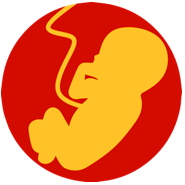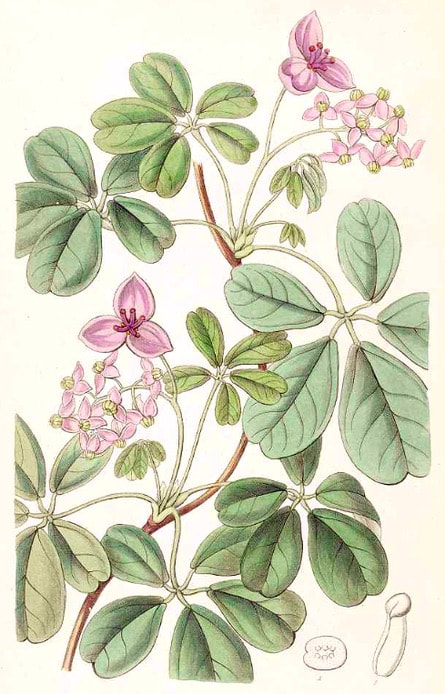Sentry Page Protection
Akebia quinata
Lindley, J., Edwards’s Botanical Register (1829-1847)
Lindley, J., Edwards’s Botanical Register (1829-1847)
Botanical name:
Akebia spp.
1. A. quinata
2. A. trifoliata
3. A. trifoliata var. australis
Parts used:
Caulis
Temperature & Taste:
Cool, dry. Bitter
Classification:
C. Clears Damp, Promote Urine
Akebia spp.
1. A. quinata
2. A. trifoliata
3. A. trifoliata var. australis
Parts used:
Caulis
Temperature & Taste:
Cool, dry. Bitter
Classification:
C. Clears Damp, Promote Urine
Uses:
1. Clears Damp and Heat, Promotes Urine:
-Damp-Heat obstructing Urine with Pain and dribbling
-Hematuria with pain and obstructed urine
-Edema, Ascites
-also used for other manifestations of Damp-Heat obstruction, clearing heat and guiding downwards
2. Drains Heart Fire:
-Irritability with Mouth or Tongue sores from Heart Fire
3. Moves the Blood, Opens Obstructions:
-Amenorrhea
-Joint pain and stiffness (TCM)
-Rheumatism (Duke)
4. Promotes Lactation:
-insufficient Breast Milk in nursing mothers
Dose:
Decoction: 3–6 grams, up to 9 grams
Substitutes:
1. Clematis armandii (Chuan Mu Tong) and Aristolchia rnanshuriensis (Guan Mu Tong) are both alternate herbs with similar effects. Aristolchia is no longer used due to its aristolchic acid content, a known nephrotoxin. Clematis Chuan Mu Tong is used synonymously with Akebia Mu Tong and has the same effects.
Preparation:
Stir-fried until scorched moderates its coldness and therefore doesn't injure the Stomach.
Decoction: 3–6 grams, up to 9 grams
Substitutes:
1. Clematis armandii (Chuan Mu Tong) and Aristolchia rnanshuriensis (Guan Mu Tong) are both alternate herbs with similar effects. Aristolchia is no longer used due to its aristolchic acid content, a known nephrotoxin. Clematis Chuan Mu Tong is used synonymously with Akebia Mu Tong and has the same effects.
Preparation:
Stir-fried until scorched moderates its coldness and therefore doesn't injure the Stomach.
Main Combinations:
1. Obstructed Urine with painful and dribbling urine from Damp-Heat:
i. Akebia Mu Tong, Plantain seed (Che Qian Zi), Gardenia Zhi Zi, Talcum (Hua Shi)
ii. Akebia Mu Tong with Smilax glabra Tu Fu Ling, Imperata Bai Mao Gen,
iii. Akebia Mu Tong with Polyporus Zhu Ling, Talcum (Hua Shi)
iv. Akebia Mu Tong with Black Nightshade root and Coriander (Su Song)
2. Stones with pain and obstructed urine:
i. Akebia Mu Tong with Lysmachia Jin Qian Cao, Lygodium spores Hai Jin Sha
ii. Akebia Mu Tong with Plantain seed (Che Qian Zi), Pumice Fu Shi, Talcum Hua Shi
3. Edema, Akebia Mu Tong with Poria Fu Ling, Polyporus Zhu Ling
4. Mouth Ulcers with Irritability and Insomnia from Heart Fire, Akebia Mu Tong with Rehmannia Sheng Di Huang
5. Insufficient lactation:
i. Akebia Mu Tong with Fennel seed
ii. from deficiency, Akebia Mu Tong with Astragalus Huang Qi, Dang Gui
iii. Akebia Mu Tong made into a soup with Pig's feet.
6. Joint Pain from Wind-Damp, Akebia Mu Tong with Stephania Han Fang Ji, Atractylodes Cang Zhu
7. Amenorrhea from Blood Stasis:
i. Akebia Mu Tong with Dang Gui, Ligusticum Chuan Xiong
ii. Akebia Mu Tong with Achyranthes Niu Xi, Safflower (Hong Hua)
8. Drug Dermatitis (after penicillin etc.), Akebia Mu Tong with Violet (Zi Hua Di Ding), Artemeisa Yin Chen Hao, Chrysanthemum indicum Ye Ju Hua, Rehmannia Sheng Di Huang, Honeysuckle Jin Yin Hua. (Barefoot Doctors Manual)
9. Severe Frostbite: Akebia Mu Tong with Dang Gui, Cinnamon (Rou Gui), Paeonia Bai Shao, Licorice, Asarum Xi Xin, Fresh Ginger, Chinese Red Dates (Da Zao), decocted for internal administration. (Barefoot Doctors Manual)
Major Formulas:
Dao Chi San
Ba Zheng San
Mu Xiang Liu Qi Yin
Zhu Ling Tang
Cautions:
1. Not used during Pregnancy
2. Avoid in Yang or Qi deficiency
3. Should only be used in cases with Damp-Heat
4. Note that various species of Aristolchia have been used as this herb, or to adulterate it. Caution is required to make sure that these are not used in place of Akebia spp.
Toxicity:
Overdose may cause colic and diarrhea.
Main Preparations used:
1. Not used during Pregnancy
2. Avoid in Yang or Qi deficiency
3. Should only be used in cases with Damp-Heat
4. Note that various species of Aristolchia have been used as this herb, or to adulterate it. Caution is required to make sure that these are not used in place of Akebia spp.
Toxicity:
Overdose may cause colic and diarrhea.
Main Preparations used:


